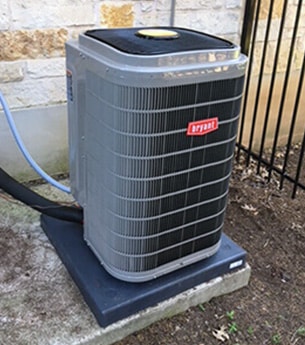Expert Air Conditioner Installation & Replacement in Austin, TX
For over 30 years, ABA Heating and Cooling has helped Austin homeowners stay cool with new, energy-efficient air conditioning systems.
Air Conditioner Installation Contractor in Austin
If you live in the Austin area, your air conditioner is most likely the single biggest use of energy in your home. A properly designed and energy-efficient cooling system will greatly impact your energy costs. Ensuring your home’s AC system is running as efficiently as possible is important for every homeowner in Texas.
At ABA Heating and Cooling, we can provide you with AC installation with units from many famous brands, including Bryant®, Trane®, Carrier®, and other popular manufacturers. We provide installs for both residential and commercial properties. In addition to our installation service, we also provide routine maintenance and repair.
We know your time is valuable! Our HVAC technicians will work diligently to replace your old system. We will do all we can to ensure that your home is left the same way it was when we first arrived. We know you will be pleased with our affordable installation services!

When Should You Replace Your AC System?
Wondering when it’s time to replace your AC system? Here are key indicators:
- Your current AC unit is over ten years old.
- You are experiencing frequent problems.
- You are increasing the square footage of your home.
- You are constantly repairing your ac system
- Your SEER Rating is Low
- Your energy bills are higher in summer months
A well-maintained AC system will keep you cool for around ten years with out the nee. Schedule regular maintenance and repairs to get the most out of your existing system. However, ABA Heating and Cooling can quickly replace your air conditioning system when needed.
Types of Cooling Systems We Install in Austin
Central Air Conditioners
Central air conditioning systems work by circulating cool air through supply and return ducts in your home. Supply ducts and registers (the vents in your home) carry cool air from your air conditioning system to various areas in your home. As this air circulates, it becomes warmer and flows back into the central air conditioning system through return ducts.
Ductless Mini-Split Air Conditioning Systems
We design ductless mini-split systems with one outdoor heat pump and one indoor unit. The indoor units are often wall-mounted and deliver hot or cold air into your living space without ductwork. They are great for only cooling certain rooms or areas in your home and saving you money.
Packaged Air Conditioning Systems
Packaged air conditioning systems are designed for homes or buildings with little interior space for a traditional split central cooling system. They work the same way a central air conditioning system works, without the extra indoor space needed for the circulation systems. They have everything needed to cool your home or building in one package, usually located outside the building.
Window Units
Window air conditioning units are designed to sit in the space created by an open window. They are an alternative to central cooling systems and are often installed in houses or buildings with no ductwork. These systems could be more efficient but great at keeping small spaces cool.
Benefits of Installing an energy-efficient AC System
Replacing your air conditioning unit is a significant investment, but it comes with many benefits:
- Greater energy efficiency
- Improved home comfort
- Greater flexibility
- Improved indoor air quality
- Lower utility bills
- Quieter operation
- Improved technology, including smart controls
Our ABA Heating and Cooling team is committed to helping Austin area home and business owners stay cool during the hot summers. Contact us today to learn how a new HVAC unit can benefit you.
Contact Us Today To Schedule Air Conditioner Replacement
Looking for a reliable AC installation contractor in Austin, TX? Our dependable HVAC technicians provide expert services and advice to home and business owners. Schedule a free AC installation estimate by calling 512-687-1463 or fill out our online contact form to have our experts contact you.
Related AC Installation & Replacement Articles
Heat Pumps vs. Furnaces: Which Is Best for Your Home?
Our team at ABA Heating and Cooling in Austin, TX, has installed heat pumps and furnaces in homes across our service area for years. When meeting with our customers, our team always gets two questions: What is the difference between a heat pump and a furnace, and which one should
What Is a Mini Split and How Does It Work?
What Is a Mini Split? A mini split is a type of heating and cooling system that offers a flexible and energy-efficient alternative to traditional HVAC units. The “mini split” refers to the fact that the system has two primary components: an outdoor compressor/condenser and one or more indoor air-handling
Common Reasons Your Air Conditioner Is Running but Not Cooling
Your air conditioner is meant to keep your home cool, so when it fails to do so, it can be incredibly frustrating. During the hot summer months, you rely on your AC for comfort. There are several reasons why your air conditioner might be running but not cooling. It could

